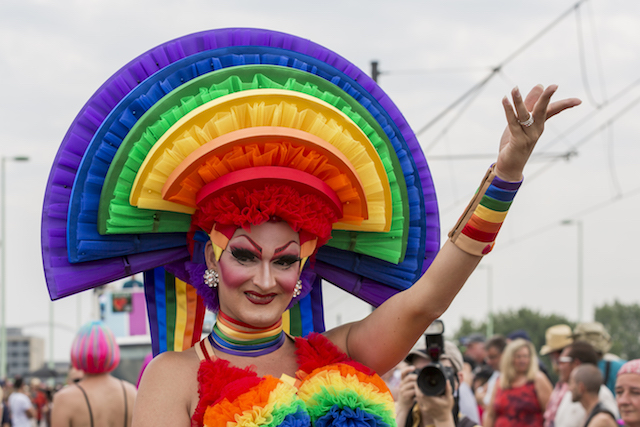LGBTQIA Pride Month events have me reflecting on how important these times are for us.
Being a part of this community often holds many challenges. These challenges are what make this month of celebrating joyful and free:
1. Our relationships with family and close friends are impacted.
Starting from a young age, many of us have to hide our identities in some capacity. We hide major parts of ourselves from the people we love the most due to a fear of being rejected or abandoned. We fear being disowned and asked to leave the house.
At a young age, some of us are left homeless due to our sexuality or gender identity. We are forced to develop plans about where to sleep, eat, and find emotional support. We are faced with the options of rejecting ourselves or being rejected by society.
If we are not asked to leave the house, we can carry the weight of our families’ grief. We tread the waters and watch waves of denial, bargaining, anger, and depression until they accept us.
The people we are most attached to pull away physically, emotionally, and mentally for an indefinite amount of time. Meanwhile, we are there—waiting—and told to be “patient” with them through this “hard time.”
It is implied that our families are sacrificing for us and, therefore, our feelings are often dismissed, minimized, and invalidated. We are forced to swim deep and tumultuous waters in isolation.
Some of our parents never come to acceptance. Others accept with terms and conditions such as:
“I will accept you, but not your partner.”
“I will have them for Thanksgiving, but I am not attending your wedding.”
“Please do not bring your friend to dinner.”
“Please keep your friend a secret from the rest of the family.”
In many situations, the strain on our families and close friends can hurt and end relationships. In the end, we often need to let go of a connection that we deeply loved.
2. Our rights have been compromised and continue to be in question.
Until recently, we did not have the right to marry. Once the federal law was passed, some states rallied against the “unnatural” bond between our beloveds and us. These laws and those supporting them, symbolically and concretely look us square in the eyes saying, “You are not good enough to share the legal benefits of your partner. You cannot be a default person if they are ill. If you share a child, it is not as legitimate as our heterosexual citizens.”
We have limited opportunities because we fall in love with someone of the same sex.
Unlike the ease of a heteronormative or heterosexual individual, we have to take time to contemplate where to use the bathroom and where to change in a locker room. Our physical and mental safety depends on answering these questions correctly, as we risk being assaulted.
In some states, businesses can fire us no matter how hard we have worked. In parts of the world, we can be killed.
The list of restrictive rights and freedoms is longer than what can be typed in this article. However, these examples portray the daily injustices served to us by our cities, states, and countries.
3) Our communities outside of LGBTQIA hold limitations and unspoken guidelines.
The bond building that happens with ease when someone fits heteronormative or heterosexual roles is disturbed for us. When attempting to join heterosexual and gender normative communities, our intentions can be questioned. We can be seen as “contagious” if we get too close.
If we are to have feelings for someone who is not identified as LGBTQIA, our ability to maintain boundaries gets called into question. To avoid all of the feelings and emotions triggered by these events, people pull away and our sense of belonging in communities falls apart.
If we are a part of a heteronormative or heterosexual majority based community, then those individuals in the majority can feel insecure even with the extension of a compliment. Instead, intimacy is usually withheld to prevent any possible misunderstandings. Giving us a compliment on our appearance or enjoying a moment of intimacy, that would otherwise be okay if both parties were straight or heteronormative, can hold an unspoken—and often unconscious—threat.
There is the experience of mutual feelings between an individual identified as LGBTQIA and a heterosexual or heteronormative individual. Often, it is followed with the non-LGBTQIA identified individual’s parents, family members, and friends’ accusations against us. We are marked with a scarlet letter reading: manipulative, evil, selfish, or disturbed.
When we desire to join a religious community to support our spirituality, we have to filter through welcoming and non-welcoming groups. We become familiar with having pamphlets waved in our faces reminding us of our “fast track to hell” in choosing this life.
Our gender, if not normative, is something we are doing for “attention.” Our gender declares us as mentally ill, disturbed, or terribly lost. Those of us with a different gender than the “normal,” require years—and sometimes therapy—to accept being uncomfortable in most outings. Once we accept and begin to transition, finally feeling at home in our bodies, we are rejected and abandoned by people and communities we deeply love.
4) The safety of our bodies, minds, and hearts can be at risk.
We take the chance of verbal, nonverbal, or physical aggression when we hold the hand of our partner in public. Some of us take this same risk simply by walking down the street.
At all ages, we are bullied and isolated at school or work. We resort to playing detective, placing people in categories of safe and unsafe to deflect the risk of segregation, judgment, rejection, and assault.
We can face isolation and condemnation for our differences triggering anxiety, depression, and trauma. We can be beaten in bathrooms, raped in the streets, hanged to our deaths, and bullied into taking our own lives.
Many of us walk around hurt and guarded with the anticipation of being hurt by others’ judgments. We are often placed in the face of danger physically, mentally, and emotionally.
The list of moments filled with shame, grief, loneliness, fear, panic, terror, helplessness, anger, rage, and confusion is boundless. So, thank you all for your support and love this last month.
Thank you for your flags, temporary tattoos, reactions on Facebook, and articles with queer folk on the front. You’ve given us space to breathe, be seen, allowed, and accepted. But please don’t forget the day in and day out challenges that are presented for us—at all ages. Remember, love is just love, and our bodies are our bodies.
We want and need to belong.
~
Author: Jess DiNisco
Image: Wikimedia Commons
Editor: Leah Sugerman
Copy Editor: Nicole Cameron
Social Editor: Khara-Jade Warren


 Share on bsky
Share on bsky





Read 0 comments and reply